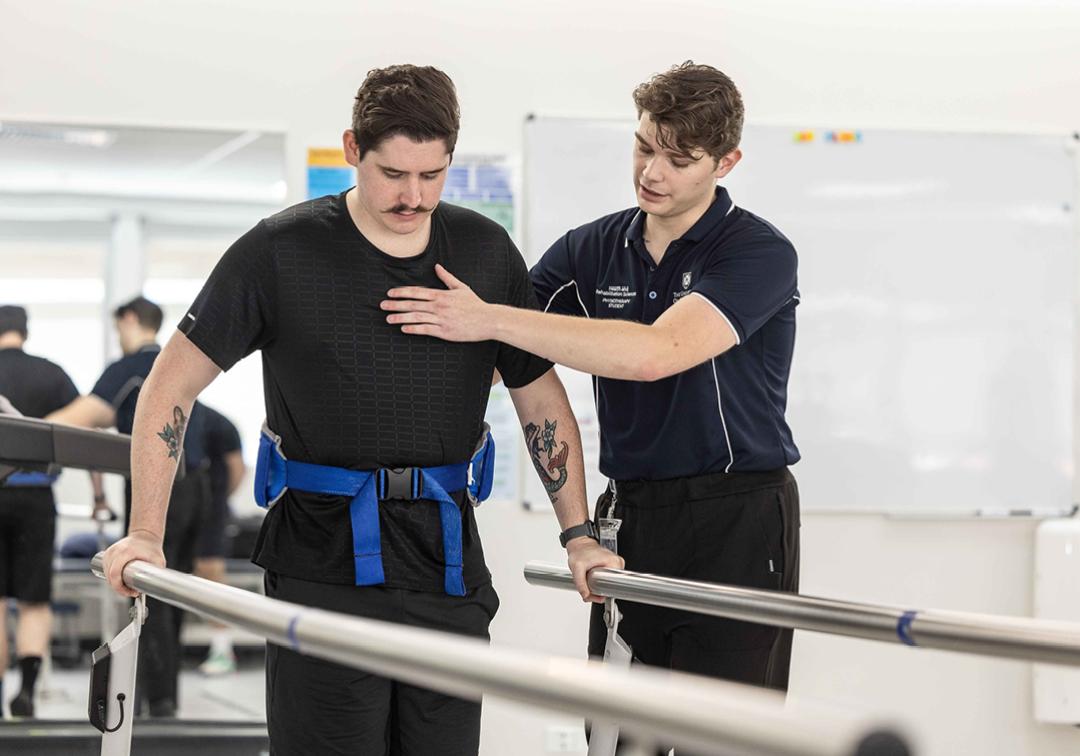
Bachelors of Engineering (Honours) / Science
Overview
Apply interdisciplinary expertise to tackle some of the world’s most complex challenges and prepare for an exciting career.
This dual degree combines an honours-level engineering qualification with a science degree, expanding your career opportunities across multiple industries.
In the 4-year engineering program, you'll build technical expertise in your core specialisation, with the option to enhance your skills through a major or minor in an emerging field.
Your choice of major can lead to diverse career paths, from infrastructure and healthcare to energy and software development.
The science component offers one of the broadest selections of disciplines in Australia, allowing you to tailor your studies to your interests while gaining hands-on experience through industry placements and research projects.
Graduate with specialist knowledge, advanced technical abilities, and the critical thinking and communication skills to excel in a rapidly evolving job market.
- Location
- St Lucia
- Duration
- 5 Years (or part time equivalent)
- Start Semester
- Semester 1 (23 Feb, 2026), Semester 2 (27 Jul, 2026)
- QTAC Code
- 717101
- Program Code
- 2493
- AQF
- Level 8
- Location
- St Lucia
- Fees
- A$58056
- Duration
- 5 Years
- Start Semester
- Semester 1 (23 Feb, 2026), Semester 2 (27 Jul, 2026)
- Semester dates for 2027 are yet to be confirmed
- QTAC Code
- 717101
- Program Code
- 2493
- CRICOS Code
- 080730C
- AQF
- Level 8
Program highlights
Program highlights
- Join the university with the widest range of engineering disciplines in the state.
- Choose from a diverse selection of science majors that will equip you with the skills to work independently, conduct critical experiments, analyse data and communicate findings effectively.
- Graduate with expert knowledge in your chosen field and a highly respected, globally recognised qualification.
Majors
Tailor your studies to suit your goals. This program offers these options:
- Aerospace Engineering
- Applied Mathematics
- Archaeological Science
- Artificial Intelligence
How you'll learn
Your learning experiences are designed to best suit the learning outcomes of the courses you choose.
- Lectures
- Tutorials
- Laboratory work
- Fieldwork
- Workshops
What you'll study
At UQ, degrees are called 'programs' and subjects are called 'courses'.
Career possibilities
Our programs prepare you for your first job and beyond. Depending on which major you choose, here are some of the careers you could be on your way to:
- Biomedical engineer
- Chemical engineer
- Process engineer
- Analytical chemist
- Environmental adviser
- Food technologist
- Electrical engineer
- Biodiversity project officer
- Underground planning engineer
- Agronomist
Average annual salary range
Biomedical Engineer
seek.com.au
Average annual salary range
Chemical Engineer
seek.com.au
Program accreditation
The Bachelors of Engineering (Honours) / Science is accredited by:
- Engineers Australia

I chose to study engineering as it incorporates both my interest in the STEM field and my passion for creating and designing. I am very interested in robotics, automation and artificial intelligence. With my degree, I hope to focus on automation in the healthcare industry.

I always enjoyed maths and science at high school, and I liked creating something new. So, engineering seemed like it would be a good combination of both.

I chose to study engineering as it incorporates both my interest in the STEM field and my passion for creating and designing. I am very interested in robotics, automation and artificial intelligence. With my degree, I hope to focus on automation in the healthcare industry.

I always enjoyed maths and science at high school, and I liked creating something new. So, engineering seemed like it would be a good combination of both.
Events
See all events
9 June
Master of Physiotherapy information webinar
Stories
See all stories
Uni life
What's it really like to study science at UQ?
9-minute read

Uni life
What's it really like to study engineering at UQ?
6-minute read
Stories
See all stories
Uni life
What's it really like to study science at UQ?
9-minute read

Uni life
What's it really like to study engineering at UQ?
6-minute read

UQ people
Turning her curiosity into a healthcare career
4-minute read
Entry requirements
Prerequisites
- General English subject (Units 3 & 4, C);
- Mathematical Methods (Units 3 & 4, C);
- and one of Chemistry or Physics (Units 3 & 4, C).
Prerequisites
- General English subject (Units 3 & 4, C);
- Mathematical Methods (Units 3 & 4, C);
- and one of Chemistry or Physics (Units 3 & 4, C).
Minimum entry score
Select where you studied and your qualification to see the minimum entry score you need to be considered for this program.
Use the minimum entry score as a guide. Your score must be at least equivalent to the required Australian Year 12 ATAR score. Entry scores are reviewed each year.
Equivalent subjects
| Subject | Qualification equivalent |
|---|
Entry score threshold
| ATAR / Rank | IB |
|---|---|
| 84 | 32 |
These are the lowest adjusted scores we made an offer to in Semester 1, 2025. Entry scores are based on the most recent Semester 1 intake and are updated in April each year. Meeting the entry score threshold doesn't guarantee admission.
Guarantee your place at UQ: If you meet our guaranteed minimum ATAR you could secure an offer for your preferred program.
English language requirements
IELTS overall 6.5; reading 6; writing 6; speaking 6; listening 6. For other English Language Proficiency Tests and Scores approved for UQ
TOEFL iBT (including Paper Edition) - Overall 87, listening 19, reading 19, writing 21 and speaking 19.
PTE Academic - Overall Score of 64 and 60 in all sub bands.
BE - A minimum overall grade of 4 plus a minimum grade of C in all macro skills.
CES - Overall 176 and 169 in all sub bands.
OET is not accepted.
There are other ways to meet the English language requirements. For some programs, additional conditions apply.
Inherent requirements
To complete this degree, you have to meet its inherent requirements by demonstrating essential skills and attributes. Read the inherent requirements before you apply.
Student visas
International students who are accepted into full-time study in the Bachelors of Engineering (Honours) / Science are eligible to apply for an Australian student visa (subclass 500).
There are a number of requirements you must satisfy before a visa is granted, including the Genuine Student (GS) requirement.
Entry score range
This table shows the range of entry scores for recent secondary students offered a place in the B Engineering(Hons)/BScience for Semester 1, 2025
| Without adjustments | With adjustments | |
|---|---|---|
| Highest | 99.95 | 99.95 |
| Median | 95.65 | 97.9 |
| Lowest | 81.3 | 85.3 |
Who you'll study with
Here's a snapshot of our student intake for this program in Semester 1, 2025:
| Applicant background | Number of students | Percentage of all students |
|---|---|---|
(A) Higher education study | 6 | 6.5% |
(B) Vocational Education and Training (VET) study | <5 | <5 |
(C) Work and life experience | 0 | 0% |
| (D) Recent secondary education | ||
| 84 | 90.3% |
| 0 | 0% |
| 0 | 0% |
International students | <5 | <5 |
Total | 93 | 100% |
"<5" — The number of students is less than 5.
N/A — Students not accepted in this category.
N/P — Not published. The number is hidden to protect the privacy of students in other cells.
Need help meeting the entry requirements?
We can help you meet the minimum entry score, subject prerequisites or English language requirements for your preferred program.
If you haven't studied the prerequisites or need to improve your entry score, we can help.
Majors and minors
Specialisations
Tailor your studies to suit your goals. This program offers these options:
Majors
Tailor your studies to suit your goals. This program offers these options:
Minors
Tailor your studies to suit your goals. This program offers these options:
Specialisations
Tailor your studies to suit your goals. This program offers these options:
Majors
Tailor your studies to suit your goals. This program offers these options:
Minors
Tailor your studies to suit your goals. This program offers these options:
Fees and Scholarships
Indicative annual fee
Approximate yearly cost of tuition (16 units). Your fees will vary according to your selected courses and study load. Fees are reviewed each year and may increase.
$8,195
2026
Approximate yearly cost of tuition (16 units). Your fees will vary according to your study load. Fees are reviewed each year and may increase.
AUD $58,056
2026
Government assistance
Financial aid
As an international student, you might be eligible for financial aid – either from your home country, or from the Australian Government.
HECS-HELP
Domestic places in the Bachelors of Engineering (Honours) / Science are Commonwealth supported, as long as you meet all Commonwealth supported place eligibility requirements.
This means the cost of your education is shared between you and the Australian Government. Instead of tuition fees, Commonwealth supported students pay what are called student contribution amounts.
If you have a Commonwealth supported place, you may also be eligible for HECS-HELP. This is an Australian Government loan scheme to assist eligible students with the cost of their student contribution amounts.
Centrelink support
The Australian Government offers a number of income-support payments to eligible Australian university students.
Scholarships
You may be eligible for more than 100 scholarships, including:
How to apply
Applying online
If your senior schooling is from outside Australia, you can submit your application to UQ. Or, if you prefer, you can use an approved UQ agent near you.
The program code for the Bachelors of Engineering (Honours) / Science is 2493.
How to apply for undergraduate study
If your senior schooling is from Australia
Submit your application to the Queensland Tertiary Admissions Centre if you're an international student who is currently studying:
- Australian Year 12 (in Australia or another country), or
- the International Baccalaureate in Australia.
The QTAC code for the Bachelors of Engineering (Honours) / Science is 717101.
Applying through QTAC
All domestic applications should be submitted to the Queensland Tertiary Admissions Centre (QTAC).
The QTAC code for the Bachelors of Engineering (Honours) / Science is 717101.
Important dates
If you’re studying Year 12 in Australia, go to the QTAC website to check the closing date for this program.
If you’re applying to UQ, the closing date for this program is:
- To commence study in semester 2 - May 31 of the year of commencement.
- To commence study in semester 1 - November 30 of the previous year.
Visa processing times vary. Apply and accept your offer as early as you can.
To learn more about UQ dates, including semester start dates, view the Academic Calendar.
Important dates
To check the closing date for this program, go to the QTAC website.
To learn more about UQ dates, including semester start dates, view the Academic Calendar.
Admissions schemes
Applying to university can be both exciting and daunting, which is why we’ve tried to make the process as simple as we can.
We have several schemes in place to improve your chances of getting a place at UQ.
Pathway options
A rank or score doesn’t determine your potential.
If you're not offered a place in your first-choice program – or if you don't meet the entry requirements – you still have a number of options.
Aboriginal and Torres Strait Islander applicants
For support with applying – or if you have any questions about university life – get in touch with our Aboriginal and Torres Strait Islander Studies (ATSIS) Unit.
Explore other programs
Bachelor of Engineering (Honours)
Bachelor of Engineering (Honours) and Master of Engineering
Bachelor of Science
Bachelor of Advanced Science (Honours)
Express yourself. And your interest.
They say choosing a degree is hard, which is why we've made it easy. Register your interest and we'll send you everything you need to know about applying to UQ.
We will use your information to keep you informed about UQ programs, news, events and scholarships. By submitting this form, you consent to the terms of UQ's Marketing consent and privacy notice.




